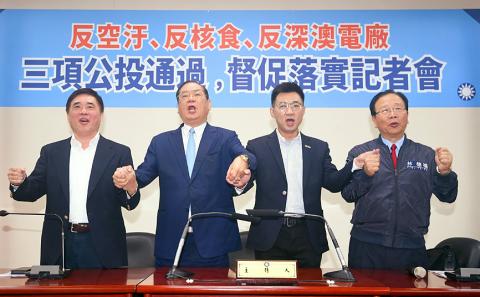The government should start preparing to implement the policies demanded by referendums that passed on Saturday last week, Chinese Nationalist Party (KMT) Vice Chairman and Secretary-General Tseng Yung-chuan (曾永權) said yesterday at an event with sponsors of the KMT-backed referendums.
The party’s politicians proposed referendums on annual cuts to electricity generation at thermal power plants, halting construction or expansion of coal-fired power plants or generators and maintaining a ban on food imports from five Japanese prefectures instituted following the 2011 Fukushima Dai-ichi nuclear power plant disaster.
The three referendums received more “yes” votes than all the ballots cast for KMT candidates in the nine-in-one elections, which showed that the public is interested in the issues, Tseng said.

The KMT would oversee the government, both at the Legislative Yuan and at the local level, to ensure that the referendum results are implemented, Tseng said, adding that the Executive Yuan is responsible for upholding the ban on Japanese food imports.
The referendum is not seeking to restrain Japan, but the Taiwanese government, as the Council of Agriculture and Representative to Japan Frank Hsieh (謝長廷) have been pushing to lift the ban, Tseng said.
KMT Vice Chairman Hau Lung-bin (郝龍斌), initiator of the food ban referendum, said that Taiwan can uphold the ban.
The government has cited a WTO ruling against South Korea’s ban on Japanese food imports in Dispute Settlement 495, but Seoul has continued to enforce the ban, Hau said.
“If South Korea can, so can we,” he said.
KMT Legislator Lin Te-fu (林德福), who initiated the referendum against new coal-fired power plants, said that all referendums supported by the KMT were concerned with people’s health and living standards.
Speaking on behalf of KMT Taichung mayor-elect Lu Shiow-yen (盧秀燕), who proposed the referendum on cutting electricity output from thermal power plants, KMT Policy Committee convener Johnny Chiang (江啟臣) said that it was not a consultation and that the government must take action to realize the results of direct democracy.
“This referendum should not become the most expensive opinion poll [this nation has ever seen],” he said.
Separately yesterday, the Executive Yuan said that it respects the passage of a referendum that asked: Do you agree that subparagraph 1, Article 95 of the Electricity Act (電業法), which reads: “Nuclear-energy-based power-generating facilities shall wholly stop running by 2025,” should be abolished?
However, Executive Yuan spokeswoman Kolas Yotaka said that while the subparagraph has been repealed, the administration’s determination to create a nuclear power-free environment remains unchanged.
Plans to transition to alternative sources of energy would continue as planned, while the government would consider adopting a more flexible energy policy, Kolas said, adding that the goal of a nuclear-free homeland would be realized at a natural and gradual pace.
Additional reporting by Lee Hsin-fang

A group of Taiwanese-American and Tibetan-American students at Harvard University on Saturday disrupted Chinese Ambassador to the US Xie Feng’s (謝鋒) speech at the school, accusing him of being responsible for numerous human rights violations. Four students — two Taiwanese Americans and two from Tibet — held up banners inside a conference hall where Xie was delivering a speech at the opening ceremony of the Harvard Kennedy School China Conference 2024. In a video clip provided by the Coalition of Students Resisting the CCP (Chinese Communist Party), Taiwanese-American Cosette Wu (吳亭樺) and Tibetan-American Tsering Yangchen are seen holding banners that together read:

UNAWARE: Many people sit for long hours every day and eat unhealthy foods, putting them at greater risk of developing one of the ‘three highs,’ an expert said More than 30 percent of adults aged 40 or older who underwent a government-funded health exam were unaware they had at least one of the “three highs” — high blood pressure, high blood lipids or high blood sugar, the Health Promotion Administration (HPA) said yesterday. Among adults aged 40 or older who said they did not have any of the “three highs” before taking the health exam, more than 30 percent were found to have at least one of them, Adult Preventive Health Examination Service data from 2022 showed. People with long-term medical conditions such as hypertension or diabetes usually do not

POLICE INVESTIGATING: A man said he quit his job as a nurse at Taipei Tzu Chi Hospital as he had been ‘disgusted’ by the behavior of his colleagues A man yesterday morning wrote online that he had witnessed nurses taking photographs and touching anesthetized patients inappropriately in Taipei Tzu Chi Hospital’s operating theaters. The man surnamed Huang (黃) wrote on the Professional Technology Temple bulletin board that during his six-month stint as a nurse at the hospital, he had seen nurses taking pictures of patients, including of their private parts, after they were anesthetized. Some nurses had also touched patients inappropriately and children were among those photographed, he said. Huang said this “disgusted” him “so much” that “he felt the need to reveal these unethical acts in the operating theater

Heat advisories were in effect for nine administrative regions yesterday afternoon as warm southwesterly winds pushed temperatures above 38°C in parts of southern Taiwan, the Central Weather Administration (CWA) said. As of 3:30pm yesterday, Tainan’s Yujing District (玉井) had recorded the day’s highest temperature of 39.7°C, though the measurement will not be included in Taiwan’s official heat records since Yujing is an automatic rather than manually operated weather station, the CWA said. Highs recorded in other areas were 38.7°C in Kaohsiung’s Neimen District (內門), 38.2°C in Chiayi City and 38.1°C in Pingtung’s Sandimen Township (三地門), CWA data showed. The spell of scorching